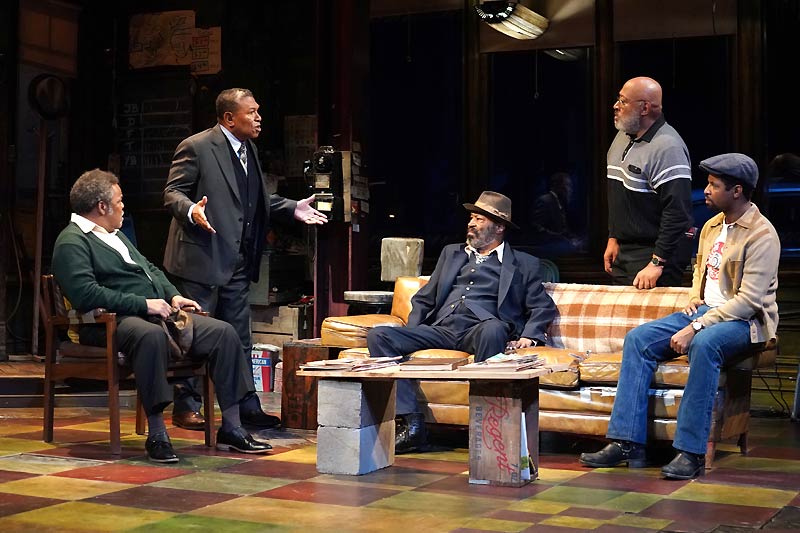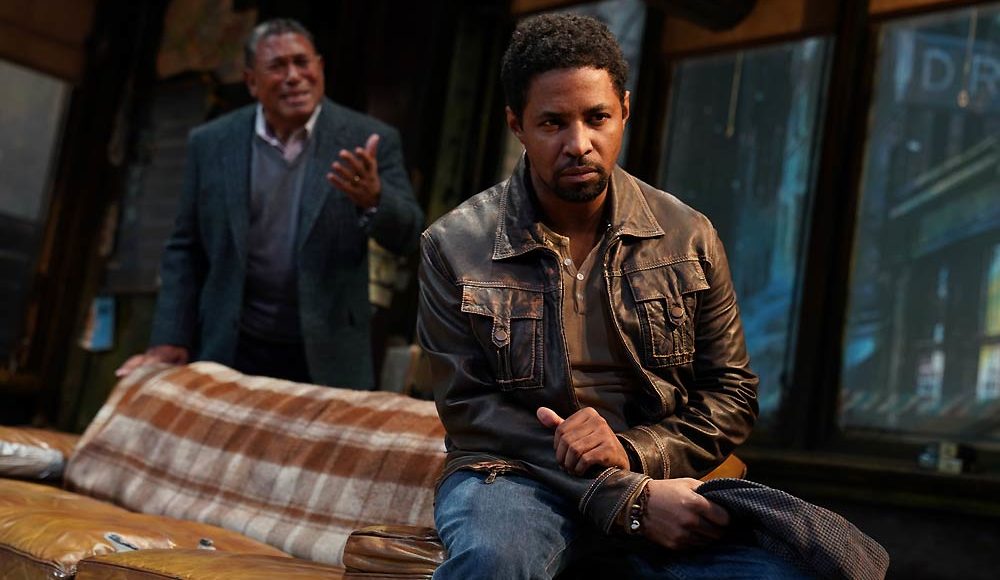By Ernest Kearney — With his play Jitney, August Wilson provided the book-end for both extremes of his ten-play series The Pittsburgh Cycle, which explores the black experience in the America of the 20th century.
Written in 1979 and produced three years later at Pittsburgh, Pennsylvania’s Allegheny Repertory Theatre, Jitney was among August Wilson’s earliest plays and one that he continued to work on for two decades.
It “premiered” a second time in 1996 at the Pittsburgh Public Theater after considerable re-writing. After further re-working by Wilson, it opened at the Second Stage Theater Off-Broadway in 2000. It was also the last play in Wilson’s cycle to receive a Broadway opening in 2017, twelve years after the playwright’s death.
The series in which Jitney belongs is sometimes referred to as the “Century Cycle;” as each of its ten plays are set within a different decade:
Gem of the Ocean 1904 (written in 2003)
Joe Turner’s Come and Gone 1911
(written in 1984)
Ma Rainey’s Black Bottom 1927
(written 1982)
The Piano Lesson 1936 (written 1990)
Seven Guitars 1948 (written in 1994)
Fences 1957-1958 and 1963 (written
1983)
Two Trains Running 1969 (written
1991)
Jitney 1977 (written 1979 thru 1996)
King Hedley, II 1985 (written 1999)
Radio Golf 1997 (written 2005)
The play’s title refers to jitney cabs, also known as pirate taxis, gypsy cabs, car services or non-medallions; which were unlicensed, personally owned vehicles, (similar to today’s ridesharing operations like Uber and Lyft) that provided cab service to America’s inner cities.
These businesses were found most often in heavily black urban areas. The reason for this was twofold. First was cost, with the illegal taxicabs charging passengers substantially less than the commercial cabs (jitney was East Coast slang for a nickel). The second reason was one of discrimination, as often both white cabbies and the companies they drove for refused to serve the African-American communities.

L-R: Ray Anthony Thomas, Steven Anthony Jones, Anthony Chisholm, Keith Randolph Smith and Amari Cheatom in August Wilson’s “Jitney” directed by Ruben Santiago-Hudson. Photo by Joan Marcus.
The story told in Jitney is typical of Wilson’s works; an understated tension originating from the central character. In this case, it’s between Becker (Steven Antony Jones) the über-mensch manager of the Jitney car service and his son Booster (Francois Battiste) recently released from prison.
This father-son conflict is encased within a series of secondary clashes: Youngblood (Amari Cheatom) the Nam vet struggling to make a life for himself and his child’s mother (Nija Okoro) and who objects to Turnbo (Ray Anthony Thomas) the company’s nosy parker, always getting into his business. Shealy (Harvy Blanks) the numbers runner always trying to use the office phone to conduct his business; Fielding (Anthony Chisholm) whose alcoholism is becoming unacceptable, Doub (Keith Randolph Smith) the voice of reason among his unreasonable co-workers, and Philmore (Brian D. Coats) who just wants to hire a car when he needs one.
These are conflicts in a minor key.
Outside these two layers of dramatic discord emanating from Wilson’s characters, as in nearly all of his works, is the lurking current of cosmic irony, the force outside the control of the dramatis personae, at times even outside their awareness, which threatens their world with chaos and destruction.
Jitney, like the majority of Wilson’s works, is an eloquent and ephemeral etching. His plays lack the solid narrative spine of conflict to which the dramatic events of each work is attached; rather, the conflicts are offshoots from the core of personalities he’s devised to drape his dramas over. His conflicts are like those serpentine fireworks from which the initial burst scatters, skittering incendiaries outwards into a bouquet of flaring stars.
In the works of August Wilson, the conflict is typically defused and diluted, and the dramatic narratives tend not to be what the playwright seems most committed to. Rather, the narrative seems secondary. Its importance is to serve the writer as a foundation allowing his character composition which in turn allows for true marvel contained in the works of Wilson; the prominence of his language that radiates with a poetic hue conveying the humanity of the characters speaking it.
One doesn’t leave a performance of Wilson’s plays imbued with the tale told, one leaves with a brimming sense of the humanity he celebrates and intoxicated by the beauty of his language.
Nearly all of the actors have performed in prior productions from Wilson’s cycle, with Anthony Chisholm having earned both a Drama Desk Award and Obie Award in the role of Fielding from the 2000 off-Broadway production of Jitney.
Their past involvement with Wilson’s work rewards the present production at the Taper. For like Shakespeare, like Wilde and Shaw, Wilson is travelled best when the ground is not unfamiliar.
Director Ruben Santiago-Hudson conducts his actors like a true maestro, assuring not one false note or strained stanza mar the evening. David Gallo’s set, Toni-Leslie James’ costumes and Jane Cox’s light design make their contribution to the evening a perfect harmony.
Poor productions of great plays, still, can manage to have merit for an audience, but the experiences of great plays given great productions are nothing short of transcendental.
And that is what Jitney at the Mark Taper Forum is offering.
* * *
NOTE: In Featured Image – (l-r) Steven Anthony Jones and Amari Cheatom in August Wilson’s Jitney directed by Ruben Santiago-Hudson. Photo by Joan Marcus.
______________________________________________________________________________
Jitney
Runs through December 29, 2019
at the Mark Taper Forum
For Tickets and Information:
Online at www.CenterTheatreGroup.org
By calling Center Theatre Group Audience Services at 213.628.2772
In person at the Center Theatre Group Box Office at The Music Center





